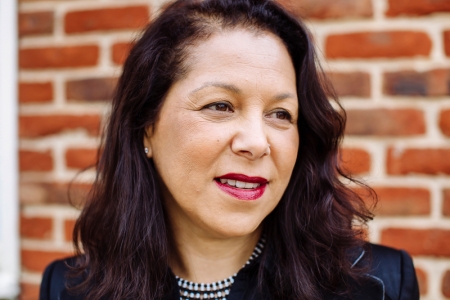The University of Portsmouth is the UK lead of an international project that aims to 're-wire' political, cultural and economic institutions to create a more gender-equal society.
The EU-funded 'Realising Girls' and Women's Inclusion, Representation and Empowerment' (RE-WIRING) project brings together six European countries and South Africa to identify the root causes of gender hierarchies and inequality.
The goal is to empower women and girls, understand the root causes of gendered power hierarchies, and contribute to the elimination of gender gaps, discrimination and biases.

Despite years of efforts to eliminate discrimination against women and girls, gender inequalities persist in Europe and worldwide. RE-WIRING aims to prevent and reverse inequalities and promote girls' and women's inclusion, representation and empowerment, to better understand the root causes of gendered power hierarchies and gender gaps.
Professor Karen Johnston, Professor of Organisational Studies
RE-WIRING brings together researchers from diverse disciplinary backgrounds, including law, social sciences, humanities, gender studies, media and culture, and political science, to map out how interrelations of power and specific barriers shape gender (in)equality and exclusion within the political, social, economic and cultural spheres, and how these can be effectively changed.
This includes not only the systems for legislating, implementing, monitoring and enforcing equality laws and policies as such, but also the policies and actions of all society - not only governments and other public bodies, but also companies, banks, social partners, health institutions, schools and academia, the media and closer to home, the family and, for example, women's organisations or religious groups.
Professor Karen Johnston, Professor of Organisational Studies at the University of Portsmouth, and RE-WIRING project member, said: "Despite years of efforts to eliminate discrimination against women and girls, gender inequalities persist in Europe and worldwide. RE-WIRING aims to prevent and reverse inequalities and promote girls' and women's inclusion, representation and empowerment, to better understand the root causes of gendered power hierarchies and gender gaps.
"Our work contributes practical, sustainable and structural change through evidence-based research to help improve understandings of gender stereotyping and multiple forms of discrimination and disadvantages."
The RE-WIRING project is not about treading the obvious, well-known paths; instead, it adopts a transformative equality approach that provides insights into how to change power structures in organisations through interventions on an institutional, symbolic and practical level.
Dr Panos Kapotas, Associate Professor in Equality and Human Rights Law
The University of Portsmouth is leading the project work package on gender equality in the labour market, which intends to address gender gaps in employment and enterprise. Its research team has developed a toolkit that aims to improve understandings of gender inequality and help organisations, businesses, managers and leaders explore ways to improve the representation of women in organisations, employment, and managerial and leadership positions. The toolkit provides evidence of better practices and guidelines that organisations can adopt and implement to transform gendered workplace culture. Examples include:
· Avoid 'fixing' women, but rather fix organisational policies and practices (e.g. salary systems based on length of tenure rather than performance, inadvertently discriminate, because women on average have shorter tenure than men, which means their average pay is lower than men's).
· Provide opportunities for networking and advancing women's social capital through internal and external events, mentoring and coaching.
· Organise role-modelling programmes around key areas of career development, including self-exploration skills, career exploration skills, and career planning and management skills.
· Re-think what is an 'ideal worker' - is it always a man, visible, full-time, reluctant to take time off, and working long hours, always online and available immediately, anytime, even on weekends, anywhere?
Our toolkit proposes strategic and tactical measures of addressing gender inequality, which interact and influence each other. Gender inequalities are created and perpetuated in the gaps between the legal framework, a company's policies and its actual practices, so organisations need to become aware of these gaps and develop ways to close them.
Dr Devran Gulel, Research Fellow in the Faculty of Business and Law
Dr Panos Kapotas, Associate Professor in Equality and Human Rights Law at the University of Portsmouth and work package lead, said: "The RE-WIRING project acknowledges that efforts to ensure a gender equal labour market, through equality laws and policies including equal pay, work-life balance, and positive action have been on the European agenda for decades. Still, these policies have not really managed to address the root causes of gender inequalities, because of the persistence and resilience of structural barriers and social stereotypes. The RE-WIRING project is not about treading the obvious, well-known paths; instead, it adopts a transformative equality approach that provides insights into how to change power structures in organisations through interventions on an institutional, symbolic and practical level."
Dr Devran Gulel, Research Fellow at the Faculty of Business and Law, said: "Our toolkit proposes strategic and tactical measures of addressing gender inequality, which interact and influence each other. Gender inequalities are created and perpetuated in the gaps between the legal framework, a company's policies and its actual practices, so organisations need to become aware of these gaps and develop ways to close them."
The RE-WIRING project is funded by the European Union's Horizon Europe programme, with UKRI funding to the University of Portsmouth, and involves a wide range of stakeholders, including the Organisation for Economic Co-operation and Development (OECD), UN Women and the European Trade Union Institute (ETUI).
The project is a collaboration involving extensive research across six countries and beyond: Belgium (Katholieke Universiteit Leuven), the Netherlands (Utrecht University and Centre for Inclusive Leadership - CFIL), Spain (University of Deusto), South Africa (University of the Western Cape), Poland (Uniwersytet Gdański), and the UK (University of Portsmouth).






